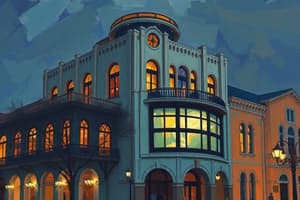Podcast
Questions and Answers
Quel mouvement artistique a mis l'accent sur des lignes organiques et fluides inspirées par la nature?
Quel mouvement artistique a mis l'accent sur des lignes organiques et fluides inspirées par la nature?
- Art Nouveau (correct)
- Bauhaus
- Art Déco
- Streamline Moderne
Quel principe est fondamental dans le mouvement Bauhaus?
Quel principe est fondamental dans le mouvement Bauhaus?
- L'unité de l'art et de l'artisanat (correct)
- L'importance des ornements
- L'utilisation de couleurs vives
- La décoration excessive
Quelle caractéristique est typique du style Streamline Moderne?
Quelle caractéristique est typique du style Streamline Moderne?
- Des lignes arrondies et fluides (correct)
- Une forte prévalence de matériaux traditionnels
- Des surfaces rugueuses et texturées
- L'utilisation de motifs géométriques
Qui est un designer emblématique du mouvement Art Déco?
Qui est un designer emblématique du mouvement Art Déco?
Quel style visait à créer un environnement agréable face à l'industrialisation?
Quel style visait à créer un environnement agréable face à l'industrialisation?
Quel est un aspect essentiel du Bauhaus par rapport à la production?
Quel est un aspect essentiel du Bauhaus par rapport à la production?
Quelle est une caractéristique des motifs utilisés en Art Déco?
Quelle est une caractéristique des motifs utilisés en Art Déco?
Quel designer est associé au Streamline Moderne?
Quel designer est associé au Streamline Moderne?
Flashcards
Art Déco
Art Déco
Un style de décoration et de design populaire dans les années 1920 et 1930, connu pour ses formes géométriques, ses lignes épurées et ses matériaux luxueux.
Art Nouveau
Art Nouveau
Un style de décoration qui a prospéré en Europe et aux États-Unis entre les années 1890 et 1910, connu pour ses lignes organiques et ses motifs floraux.
Bauhaus
Bauhaus
Une école d'art et un mouvement de design allemand fondé à Weimar en 1919, connu pour ses principes de fonctionnalité et de production de masse.
Streamline Moderne
Streamline Moderne
Signup and view all the flashcards
Arts Décoratifs
Arts Décoratifs
Signup and view all the flashcards
Style organique
Style organique
Signup and view all the flashcards
Style géométrique
Style géométrique
Signup and view all the flashcards
Style fonctionnel
Style fonctionnel
Signup and view all the flashcards
Study Notes
Art Déco and Design
- Art Déco, short for "Arts Décoratifs," was a popular style of decorative arts and design in the 1920s and 1930s.
- It emerged as a reaction against the excesses of Art Nouveau and emphasized geometric forms, sleek lines, and luxurious materials.
- Key characteristics include:
- Geometric patterns and shapes, often inspired by Cubism and Egyptian motifs.
- Use of opulent materials like lacquer, enamel, and precious metals.
- Emphasis on craftsmanship and precision.
- Streamlined, symmetrical designs.
- Designers often sought to create a sense of elegance and modernity.
Art Nouveau
- Art Nouveau was a decorative style that flourished in Europe and the United States from the 1890s to the 1910s.
- It was a reaction to industrialization and sought to create a more organic and aesthetically pleasing environment.
- Key characteristics include:
- Use of flowing, organic lines inspired by natural forms like plants and flowers.
- Intricate patterns and designs.
- Emphasis on handcrafted, bespoke items.
- Use of diverse materials, including stained glass, ceramics, and wrought iron.
- Key figures include Alphonse Mucha, Antoni Gaudí, and Louis Comfort Tiffany.
- It was often seen in architecture, furniture, and other decorative arts.
Bauhaus
- Bauhaus was a German art school and design movement established in Weimar in 1919.
- The school greatly influenced the development of modern design.
- Key principles include:
- Unity of art and craft; bringing together both the creativity of the arts, and the craftsmanship of the crafts.
- Functional design: importance of form following function.
- Elimination of superfluous ornament.
- Use of materials appropriate for mass production.
- Bauhaus teachers emphasized the importance of learning and experimenting with new ideas and materials.
- Key figures include Walter Gropius, Mies van der Rohe, and Marcel Breuer.
- The school closed in 1933 due to Nazi Germany's rise to power.
Streamline Moderne
- Streamline Moderne was a popular design movement that emerged in the 1930s and 1940s.
- The style emphasized sleek forms, aerodynamic lines, and a sense of speed and efficiency.
- Key characteristics of this style include:
- Use of rounded, flowing lines, inspired by airplane designs.
- Smooth surfaces.
- Emphasis on simplicity and clarity of form.
- The style was often used in transportation and industrial design.
- The movement's popularity stemmed from a desire for a fresh and modern look contrasted with earlier styles.
- This design aesthetic also influenced industrial design, reflecting futuristic ideals.
Studying That Suits You
Use AI to generate personalized quizzes and flashcards to suit your learning preferences.




